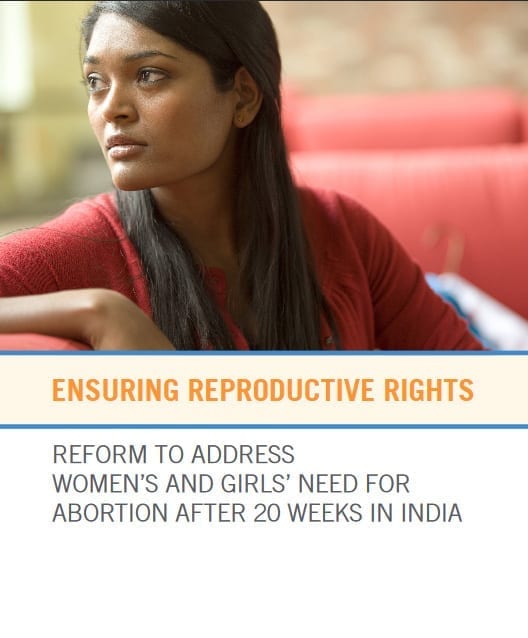Pakistani High Court Calls for Response to Allegations Women Are Denied Maternal Health Services
(PRESS RELEASE) Today the High Court of Sindh ordered the government of Sindh to respond by September 29 to a petition alleging that the government has failed to prevent the high incidence of obstetric fistula, a treatable pregnancy-related injury that afflicts hundreds of women in Sindh province each year.
On July 6, lawyer Sara Malkani—with technical support from the Center for Reproductive Rights—filed a petition with the High Court on behalf of three petitioners: gynecologist Dr. Shershah Syed, President of the Pakistani National Forum on Women’s Health, Tehrik-e-Niswan, a leading woman’s empowerment NGO, and Kiran Sohail, a mother of six who developed obstetric fistula after having her first child and was left untreated for more than eight years.
Obstetric fistula is a hole between the birth canal and the rectum or bladder that leads to continuous, uncontrollable flow of urine or feces, or both. It is mainly caused by prolonged obstructed labor without timely emergency obstetric care, however can be repaired through a surgical procedure. This condition disproportionately afflicts socio-economically marginalized Pakistani women who live in poor communities, and are unable to access timely and adequate medical treatment of decent quality.
Said Melissa Upreti, regional director for Asia at the Center for Reproductive Rights:
“It is well within the government’s power to expand women’s access to care for this devastating but treatable condition, and denying these services is a violation of women’s basic human rights.
“Thousands of women in Sindh have suffered terribly from obstetric fistula because the government has failed to implement maternal health programs that would help to prevent these grave injuries.
“Now that the High Court has recognized the severity of this situation, it must order the government of Sindh to act now to reduce the occurrence of fistula and ensure that women who suffer from it can get the care they need, when they need it.”
Despite passage of national maternal health policies, every year, close to 5,000 women in Pakistan develop fistula, with an estimated 1,500 of these women residing in Sindh where a majority of government hospitals are ill-equipped to provide fistula repair surgery.
The petition seeks to hold the Sindh government accountable for the denial of timely and adequate treatment of obstetric fistula as violations of women’s fundamental rights under the Pakistan Constitution, including their rights to life and dignity. It calls for the High Court of Sindh to order the Sindh government to ensure that access to affordable treatment for obstetric fistula is available to all women in Sindh, including a guarantee that at least one gynecologist in every district be trained and equipped to provide fistula repair surgery.
Kiran Sohail developed obstetric fistula in 2006 during the home birth of her first child. Soon after delivery, she noticed she had pregnancy-related complications, including no control of her bowel movements. Over several months, Kiran went to a number of doctors in private and government hospitals in Karachi seeking treatment, however she was not offered surgical treatment. She lived with obstetric fistula for more than 8 years, through the delivery of her second and third child, and the profound discomfort that it caused her every day. She managed to receive surgery in November 2014 after her nephew recommended she go to Koohi Goth Hospital where he worked at the time—the only hospital in Karachi that repairs fistulas and provides maternal health services to women free of charge.
“Fistula can be prevented through access to timely, affordable and quality emergency obstetric care, which is beyond the reach of most women in Sindh,” said Dr. Shershah Syed, maternal health advocate and president of the Pakistan National Forum on Women’s Health. “This case will help all of us working to enforce the responsibility of the Government of Sindh to provide emergency obstetric care and prevent and treat obstetric fistula, a traumatic pregnancy-related injury that afflicts thousands of women in Sindh every year.”
In 2006, Pakistan introduced the “National Maternal Newborn and Child Health Programme” which called for improvements to maternal and newborn child health services at all district levels, including 24 hour comprehensive emergency obstetric care, training of community midwives, access to comprehensive family planning services and general awareness of maternal health services. And although Sindh developed a Health Sector Strategy in 2012 to address maternal deaths and improve antenatal care, only four hospitals are staffed and equipped to repair fistulas in Sindh.
The Center for Reproductive Rights provided technical support to Malkani on the petition, which was developed as part of the South Asia Reproductive Justice and Accountability Initiative (SARJAI), a partnership spearheaded by the Center bringing together lawyers in the region to promote the use of legal accountability strategies to address ongoing violations of women’s reproductive rights in South Asia.

